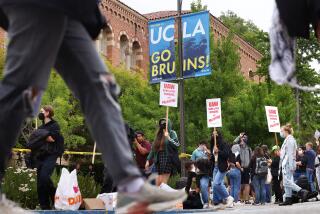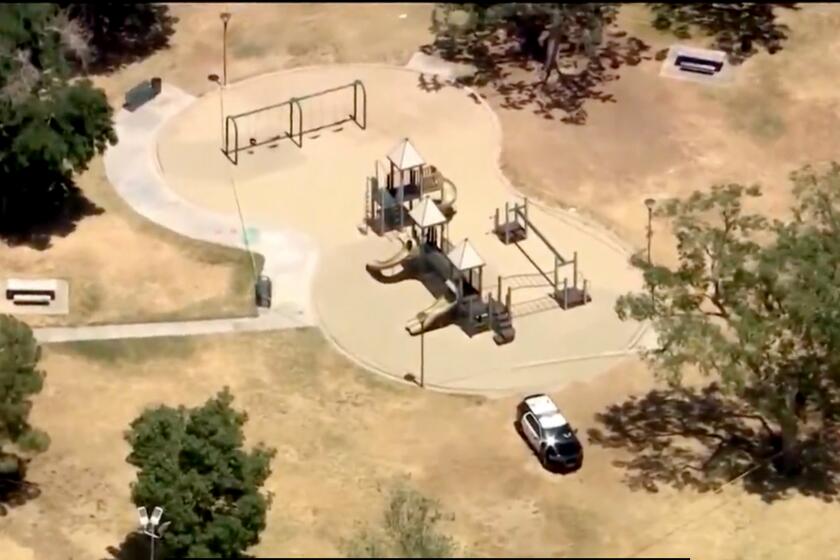L.A.’s FBI Agents Winning Crime War, Losing Pay Battle
Los Angeles FBI agents have successfully battled mobsters, bank robbers and other assorted gangsters. But one fight they say they are losing is the battle of the pocketbook.
FBI officials say the high cost of living is affecting the quality of work done by agents in large cities, including Los Angeles. Scores of agents have resigned in recent years rather than make mandatory moves to cities where they have to pay premium prices for everything from housing to groceries to their kids’ doctor bills, FBI officials say.
In an attempt to improve the situation, Congress recently approved a five-year “demonstration project” which gives New York City field office agents and a third of its support staff a 25% wage hike. But in Los Angeles and other cities, agents will have to make do with a 4.1% hike come Jan. 1.
FBI Director William Sessions said last week during a press conference that he can’t “make any promises,” but will conduct a study of the Los Angeles office and those in San Francisco, Boston and Chicago to see what can be done to upgrade salaries there as well.
Under the new program, agents from other parts of the country who sign contracts to work in New York City for at least three years will get a $20,000 lump-sum bonus under terms of the demonstration project. They will be required to live within 50 miles of their office. While FBI agents elsewhere receive an average salary of about $39,000 a year, the New York agents will receive $48,750.
Cost of the program comes from the FBI’s budget and not from special appropriations. Officials would not say what was cut to make the raises possible, noting that much of the FBI’s budget is classified.
Ranked 84th Out of 89
Officials noted that in a recent study of 89 law enforcement agencies in California, the FBI ranked 84th in salaries.
“We have agents who are the best paid people in small towns and they are transferred here and almost have to fight to keep off public assistance,” said Lawrence G. Lawler, special agent in charge of the Los Angeles division.
The problem is compounded because the nation’s 9,200 FBI agents have no choice in transfers, and because they are on call day and night they cannot move to less expensive distant suburbs as do other professionals.
The financial pinch had become so bad in New York that there were 300 job vacancies and the resignation rate was running at 4% annually, said FBI spokesman Joe Valiquette. There are about 1,200 agents and 900 support workers on the New York staff. Many agents there spend up to three hours commuting to work.
50% Loss in Salary
In 1951, an agent’s pay was equal to that of a police captain. Today the salary is 50% less than a captain’s, a government study showed. In New York City, an entry-level agent is paid about $31,000 with overtime, compared to $40,000 for rookie police officers. They also noted that most police officers receive free health insurance, while agents have to pay part of their premiums.
Since institution of the new pay program, all the New York vacancies have been filled and there is a two-year waiting period to get a job there, officials said. In Los Angeles, where 500 agents work, the resignation rate has not been calculated, Lawler said. A study is under way to access economic problems of employees.
But new agents are finding that they have to buy homes in Palmdale and commute, Lawler said. “The car pool leaves about 5 a.m. and it takes an hour and a half, if they are lucky,” Lawler said. “If there’s a bank robbery on Saturday, it gets a little ludicrous to have to drive that far.”
Los Angeles workers generally have the highest salaries in the country, so the federal government sometimes loses the best and brightest recruits to private business or to local law enforcement agencies, Lawler said.
“We have to have top-notch support people. But I have 12 secretarial openings because we lose them to private industry, which pays them $500 more.
“We have good people. Loyalty is keeping them now. If the price of bread goes up, loyalty isn’t going to be able to buy it,” Lawler said.
More to Read
Start your day right
Sign up for Essential California for news, features and recommendations from the L.A. Times and beyond in your inbox six days a week.
You may occasionally receive promotional content from the Los Angeles Times.






